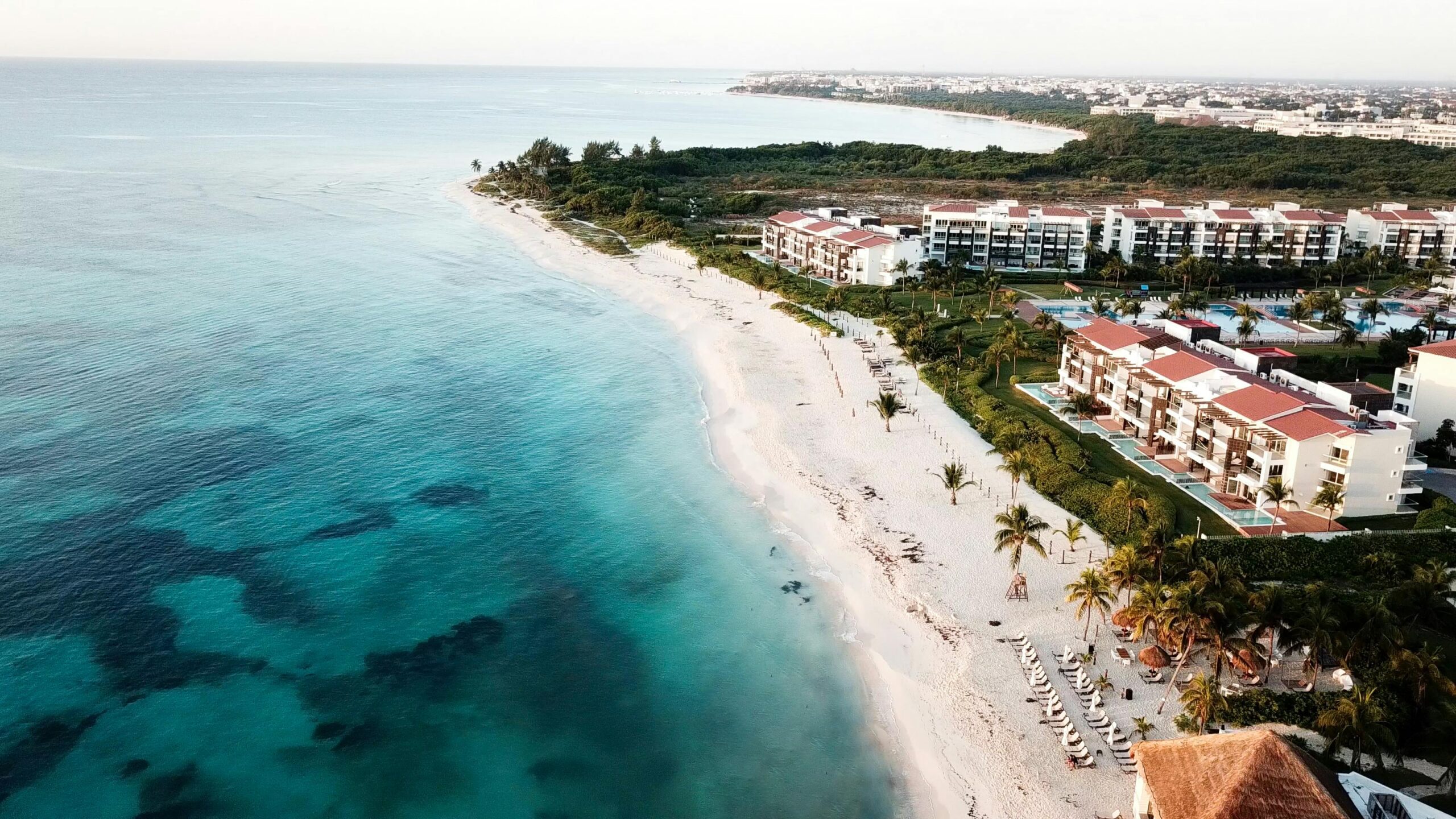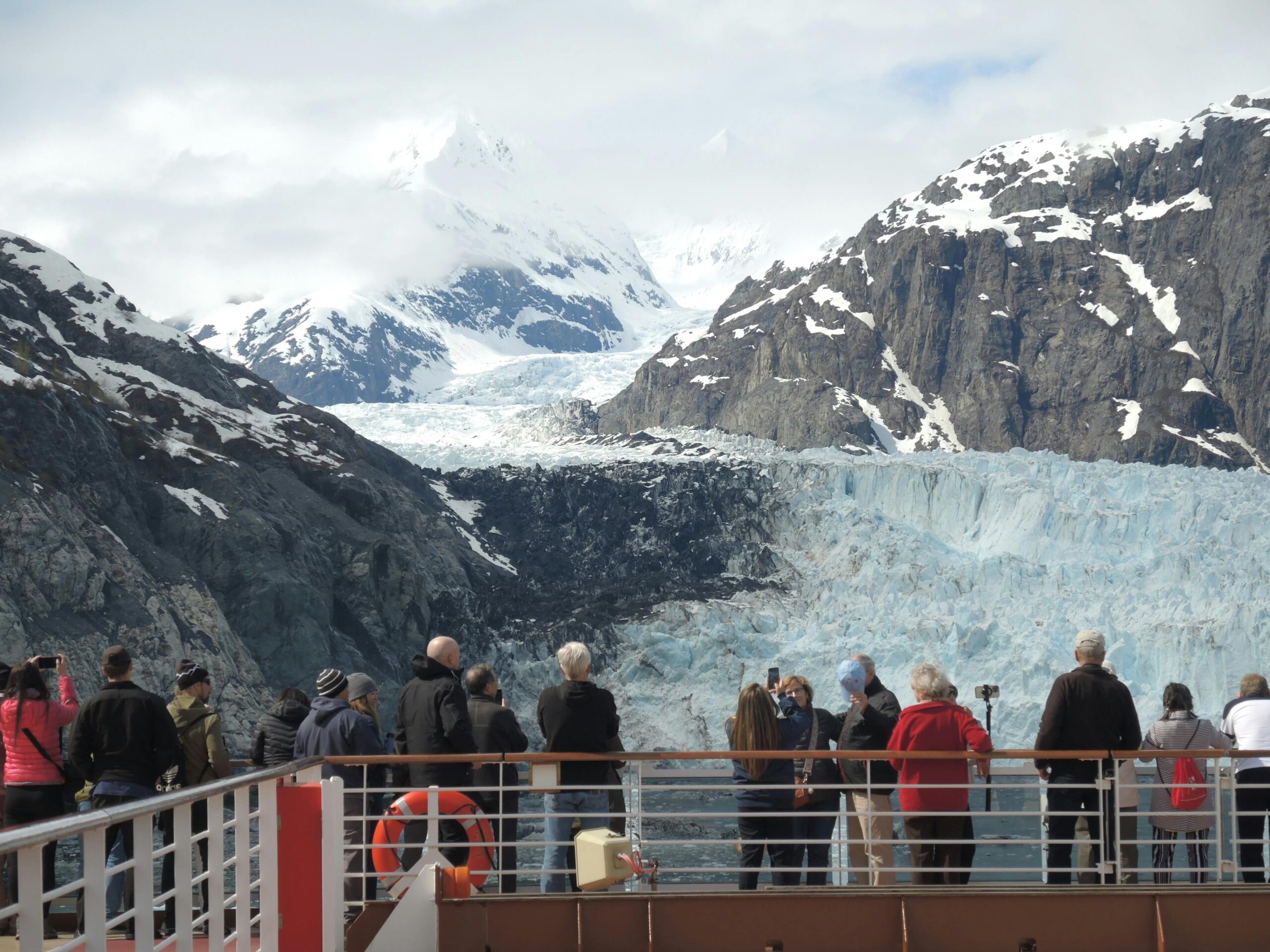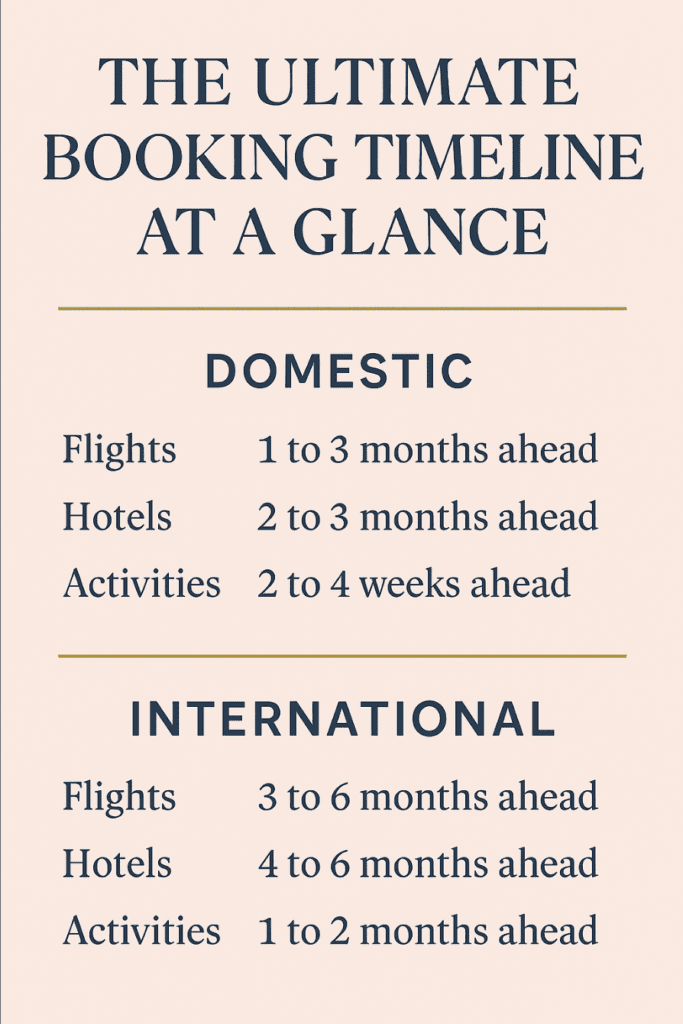
How Far in Advance Should You Book Flights, Hotels, and Activities?
The Smart Traveler’s Guide to Perfect Timing (Without Losing Your Mind)
If you’ve ever booked a flight and then watched the price plummet faster than your excitement, I feel your pain. Or maybe you waited just one more week to book a hotel and now the only thing left is a single room above a nightclub called “Rage Dungeon.” Timing matters, folks.
Whether you’re a spreadsheet-loving planner or a spontaneous let’s-wing-it type, there is a sweet spot for booking flights, hotels, and activities. And no, it’s not 11 months in advance (unless you enjoy paying extra for the privilege of being first). Let’s break down exactly when to book what—so you don’t end up broke, bitter, or bunking in a cabin an hour outside of town. (Been there. More on that later.)

Flights: The Not-Too-Soon, Not-Too-Late Goldilocks Zone
Booking flights is like baking a soufflé—there’s a delicate timing window where everything rises perfectly. Too early or too late, and things deflate into either overpriced regret or “why is my layover 14 hours in Newark?” energy.
Domestic Flights
The golden window is usually 1 to 3 months before departure. Use tools like Google Flights, Hopper, or Skyscanner to track fares. Let them obsess over price trends so you don’t have to.
- Why not sooner?
Airlines release flights up to 11 months out, but early prices are often inflated—basically a “convenience fee” for the ultra-eager. Prices dip once demand patterns settle. - Business trips
If you’re flying to major cities midweek, airlines often keep pricing steady. But the catch? Last-minute options usually come with the worst seats and soul-crushing departure times. - Holiday travel
Thanksgiving, Christmas, long weekends, or Spring Break? Book 3 to 6 months out. Not only do prices climb, but routes can sell out. Don’t be the person refreshing Google Flights on Dec. 23.
Flight Myth to Bust:
“The earlier you book, the cheaper the flight.”
Nope. Too early can cost you more. Airlines tweak prices based on demand forecasts—not your organizational skills.
Read: The Art of Booking Flights: Why You’re Probably Overpaying
International Flights
Now we’re talking long-haul strategy. The ideal booking window for international travel is 3 to 8 months before your trip—but the real magic depends on where you’re going and when.
Europe in summer?
Aim for 6 to 8 months out. The earlier you book, the better your shot at direct flights, better times, and fewer layovers. Summer travel is competitive and prices surge fast.Asia or Africa?
Book 5 to 7 months ahead, especially if you’re flying around major holidays like Lunar New Year, Diwali, or summer breaks. These routes can be limited and fill quickly.South America or the Caribbean?
4 to 6 months out usually hits the sweet spot. Watch for seasonal demand spikes (winter escapes, Carnival, etc.).Off-season travel (fall in Europe, spring in Southeast Asia)?
You’ve got a bit more wiggle room—3 to 5 months should do it. But don’t get cocky—deals go fast if airlines are running limited routes.
Flight Myth to Bust:
“Flights are always cheapest on Tuesdays.”
This one needs to retire. While airlines used to release fares on Tuesdays, today’s prices change dynamically—sometimes multiple times a day. Instead of obsessing over the calendar, use price tracking tools and monitor trends over time.

Hotels: When to Book, So You’re Not Sleeping in a Broom Closet
Booking a hotel is a delicate dance between price, location, and whether or not your window opens to a scenic brick wall.
Big Cities & Resorts
Book 3 to 6 months out for the best prices, location, and availability. Big-name cities and major resort areas get booked fast—especially if there’s a conference, festival, or seasonal event. The closer you get, the more likely you’ll be choosing between sky-high prices or questionable locations (hello, 45-minute subway ride to the city center). Booking early locks in the good stuff without breaking your budget.
Small Towns or Offbeat Destinations
1 to 3 months out is typically safe, but book earlier if you’re eyeing boutique or limited properties. Smaller towns and hidden gems don’t always have a ton of hotel options. If you’ve got your heart set on a charming inn or one-of-a-kind Airbnb, book as soon as you know your dates. These spots are often snapped up by weekenders and event-goers—especially if there’s a wedding or seasonal market in town.
Peak Season Travel
6+ months ahead is smart for holidays, festivals, or school vacations. If your travel dates overlap with peak season (think December holidays, spring break, summer vacation), don’t wait. Not only do hotels raise prices, but availability shrinks fast. This is especially true in popular family destinations and cities hosting big annual events. Booking early ensures you’re not left with only the leftover rooms—or worse, none at all.
That One Time in Amsterdam…
True story: I once waited too long to book accommodation in Amsterdam. Everything remotely central was booked, so we ended up in a rustic “cabin” outside the city. It was… an experience. Quaint, scenic, and an hour from anything. Would I do it again? Hard no. Lesson learned.
Hotel Myth to Bust:
“You’ll always find a better deal last minute.”
Only if you’re flexible and lucky. For high-demand spots or specific properties? Book early and re-check later.
Read: Avoid Travel Nightmares: 12 Expert Tips for Booking the Perfect Accommodation
Read: The Most Talked About Hotels Opening in 2025

Activities & Tours: Book It Before Becky From Boston Does
Some things you can book once you arrive. Others? Miss the window and you’re looking at a “panoramic view” of the outside of the attraction.
Must-Do Attractions
Book ASAP—2 to 4 months out if it’s a must-see. These are the iconic, bucket-list experiences people travel across the world to see—and so does everyone else. Timed entries, limited group sizes, and high demand mean these spots fill fast. Think Alhambra, Vatican tours, Machu Picchu hikes, and Broadway shows. Once your dates are locked in, grab those tickets. Waiting could leave you with nothing but FOMO and blurry photos of the exterior.
Local Tours & Food Experiences
2 to 6 weeks is usually perfect. These experiences add depth to your trip—think food tours in Lisbon, pasta-making in Rome, or ghost walks in Savannah. There’s usually more availability here than with big-ticket attractions, but popular time slots (hello, golden hour) go fast. Book earlier in peak seasons or for larger groups to avoid missing your preferred time.
Adventure & Seasonal Activities
1 to 3 months out, especially for hikes, boat trips, or weather-dependent activities. If you’re planning a guided volcano hike, a seasonal glacier trek, or that dreamy bioluminescent kayak tour—don’t wait. These types of adventures often have small group limits, rely on ideal conditions, and may only run during certain months. Booking early ensures you get in before the weather or crowds say otherwise.
Activity Myth to Bust:
“You can book most tours once you get there.”
Not anymore. With limited slots and high demand, “winging it” is a fast track to missing out.
Read: Are Tourist Traps Actually Worth It? A No-Nonsense Guide

Book Smart, Not Panicked
Booking early can save you money, stress, and the heartbreak of “sold out” signs. But too early? That’s where planners get burned.
Use alerts. Check refund policies. Embrace flexibility. And if you ever find yourself in a cabin outside of Amsterdam because you waited too long… just know you’re not alone.
Still wondering when to book your next big trip? Use this guide to time it right and make the most of every dollar—and every moment.
Ready to Plan Like a Pro?
Whether you’re booking six months out or six weeks from takeoff, timing matters—and now you’ve got the cheat sheet. Need help pulling it all together or want someone else to obsess over the details for you?
I’m a travel agent who lives for this stuff. Let’s make your next trip ridiculously smooth (and maybe even a little luxurious).






